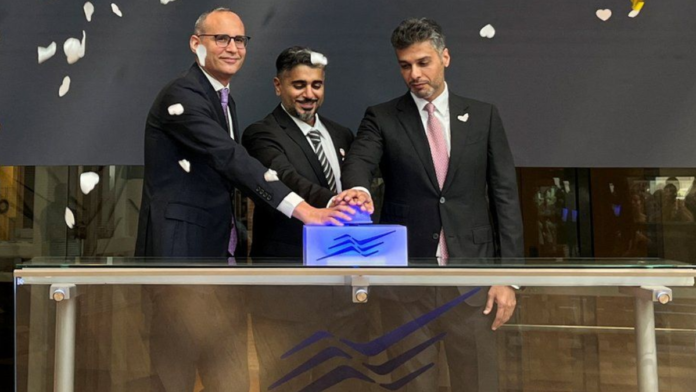
The Tel Aviv Stock Exchange’s opening bell is rung with assistance from Mohamed Al Khaja, sparking a shower of gold paper hearts across the gleaming glass structure. There is applause when Ittai Ben-Zeev, the exchange’s director, and Ahmed Al Zaabi, the head of UAE financial centre Abu Dhabi Global Market, shake hands with Mr Al Khaja, the United Arab Emirates ambassador to Israel.
The opening of the main Israeli stock exchange is not typical. Instead, it is a new achievement to be proud of in the expanding relations between Israel and the UAE. It comes two years after Bahrain and the two nations signed the famous Abraham Accords, which were mediated by the US.
Following these declarations, the UAE and Bahrain decided to reestablish full diplomatic ties with Israel. It put an end to the Gulf states’ longstanding boycott of Israel. Sabah Al-Binali, an investor from the UAE who was travelling with the team, was beaming as he saw the event in Tel Aviv earlier this month.
The executive chairman of investment group OurCrowd Arabia said, “We are witnessing history in the making, observing the steady growth of a long, deep, and fruitful partnership between natural Middle Eastern neighbours.” According to Mr Al-Binali, the expanding business connections between Israel and the UAE benefit all parties involved.
“Israeli and Emirati business and technical abilities and expertise naturally complement one another. Therefore, I anticipate the results of our collaboration to be much more outstanding than the sum of the individual parts. “To name just a few sectors where work is already advanced, we are currently looking at cooperative initiatives in logistics, med-tech, ag-tech, and cybersecurity.”
Mr Al-Binali added that several business deals had been reached with an initial understanding during the visit last month. The Abraham Accords, according to economists, will significantly improve trade between Israel and the UAE. On the one hand, Israel boasts a robust tech industry that includes military technology.
After Saudi Arabia, the UAE has the second-largest economy in the Gulf. The UAE is attempting to diversify, although oil sales remain its primary source of revenue. Algorithm Research, a data and economics research company with offices in Dubai, one of the seven emirates that make up the United Arab Emirates, was founded and is led by Ketaki Sharma.
Over the next five years, she predicts that trade between Israel and the UAE will reach $10 billion (£9.3 billion). “The agreement was inked in 2020 and has already given both Israel and the UAE a tremendous trade boost,” claims Ms Sharma.
According to UN figures, Israel’s yearly exports to the UAE increased from $74 million to $384 million between 2020 and 2021. In contrast, trade heading the other way increased from $115 million to $632 million. According to Ms Sharma, agriculture, sustainable energy, cybersecurity, and smart cities are some of the MOUs (memorandum of understanding, or outline agreements) that have been inked [between the two countries].
Early in 2022, the two nations also agreed to a free trade deal, which resulted in the elimination of tariffs on 96% of the goods exchanged between them. Following the Abraham Accords, Israel is claimed to have already surpassed sales records for its arsenal. The Israeli Ministry of Defense estimates that 2021 saw a peak in arms sales of $11.3 billion, with 7% of that amount going to the UAE and Bahrain.
According to Moshe Ya’alon, Israel’s former defence minister (2013–2016), the primary cause is an Iranian security threat that is present across the entire region. “Although the Palestinian issue still exists, there is no longer an Arab-Israeli conflict because Israel and the Gulf states are facing common opponents, particularly Iran and her proxies.”
Since then, Morocco and Israel have also agreed to a similar normalisation pact outside of the Gulf. Sudan has also been, though negotiations with Israel have stagnated in Sudan.
Israeli and UAE businesses are also signing agreements in the energy industry. Israeli company NewMed Energy announced in September 2021 that it had agreed to a $1 billion deal with UAE company Mubadala Energy to sell a 22% share in the Israeli offshore gas resource Tamar.
